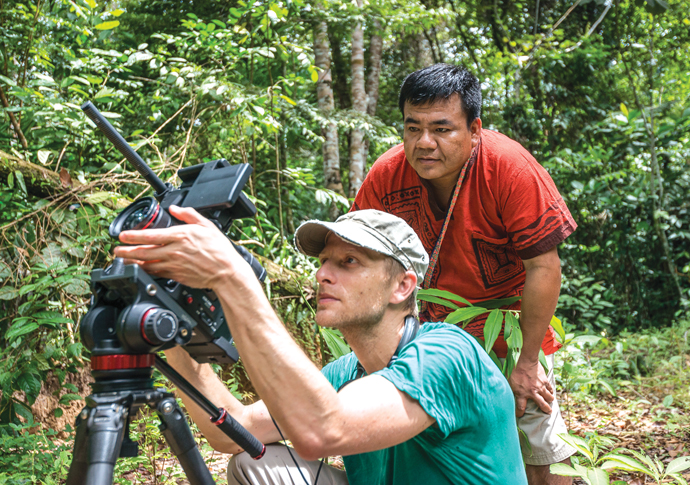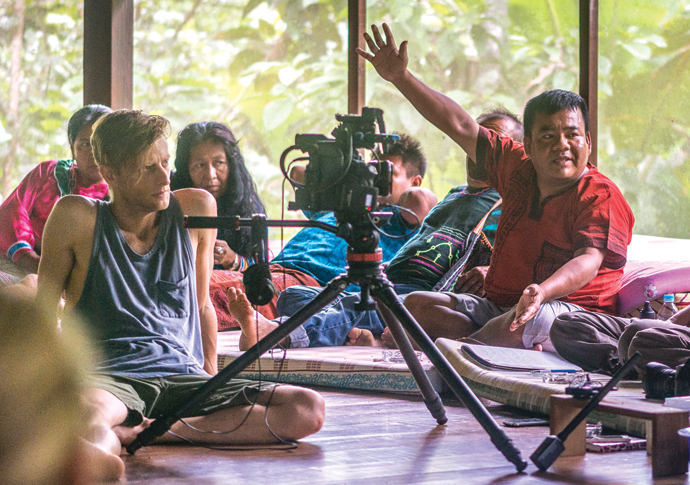Only connect
Dan Carrier talks to film-maker Marc Silver, whose new documentary Antidote explores how a vision-inducing Amazonian plant could help us tackle climate change
Thursday, 23rd March 2023 — By Dan Carrier

Marc Silver shooting in the Amazon
TREKKING through the Amazon rainforest, film-maker Marc Silver was shooting a documentary on scientists exploring the DNA of indigenous tribes.
But while he made his way along winding landscapes, another topic leapt out at him.
The result is a new documentary, Antidote, about how people in the Ecuadorian Amazon use the ayahuasca plant as a medicine, a way of inducing visions and considering one’s lot.
“I first came across ayahuasca when making a film about indigenous peoples having their blood taken and having their blood patented,” he explains.
“Scientists were looking for cures for diseases and indigenous blood was more ‘pure’ – as it hadn’t been mixed with other DNA. Under patent law the discoverer owns the patent for any discovery, rather than the person whose blood was taken. It was a form of biopiracy. On this film I heard a lot about ‘spirit’ and the ‘essence of life’, words which meant nothing to me as a Londoner. I became intrigued every time I heard about ayahuasca being used to access this spirit world.”
Marc’s work over the last two decades has focused on issues over who holds power and how they use it. His lens has turned towards topics such as the Black Lives Matter movement, migration, war and refugees, and indigenous knowledge coupled with the thirst for exploitation by big pharma and tech companies.
Marc, who lives in Highgate Newtown, said: “My work looks at power structures and the dynamics of power play out in this film. Is this a form of exploitation? What are the dominant power structures that impact the planet? How does power play out in people’s traumas?”
Marc developed the idea, researching the plants for medicinal uses and their roles in tradition, ceremony, communal bonding and familial habits.
He then found the Temple of the Way of Light in Peru, which gave him another angle, a way to consider how this process could affect those not from the rainforest.
“I was introduced to the owner of this retreat centre in 2012,” he says.
Here Marc met a collection of people who had come to find help, and their experiences form the film’s backbone.
Making a film where so much of the action is contained within the subject’s thoughts gave Marc a particular challenge.
“Because what people experience when having visions is in their head, it is invisible, unseen, unfilmable,” he says.
Tracking visitors from Europe and the USA, they hope that a session of ayahuasca will help ease personal pains.

Visitors to the Temple of the Way of Light in Peru
“Most people I met visiting had attempted forms of Western therapy,” he adds.
With this in mind, and aware of the potential vulnerability of those who had travelled some serious mileage in hope, meant the director had to tread carefully.
“Because I appreciated how vulnerable people are when they are in ceremony, I spend the first couple of nights drinking alongside them and sharing my visions the following day so that by the time I filmed anything people knew that I had been through a similar journey to them, we had some shared experiences,” he says.
Watching tourists drink this ancient drink, watching their bodies react – vomiting to sweating to defecating can happen, as well as pleasant tingles that lead to intense tranquility – could feel exploitative.
Marc was careful.
“I have spent a time considering. It’s very nuanced,” he says.
“On the one hand Westerners going to the Amazon today is part of a trajectory that began with colonialism and the extraction of rubber and oil, so I have asked myself: is this just a new form of extractivism – spiritual extractivism?
“Simultaneously there are indigenous healers who believe the plant itself is making or allowing this to happen – that if imparting knowledge changes Westerners, teaches them a different way of seeing and understanding themselves and the world, then this is a good thing.”
The plant-induced hallucinations – interpreted as visions in to a spiritual world – is not hippie-like escapism from problems that will be sitting there, waiting for you when you come down. Marc says he appreciates how the process can offer some valuable aids.
“In some of my visions, and listening to other people sharing theirs, I came to understand that if you can revisit an event in your past and perceive it with different eyes, then it can change your present and hence your future,” he adds.
The use of ayahuasca links into modern ecological philosophies, based on Professor James Lovelock’s Gaia principle, namely that the world is an interconnected living thing. Taking the plant – which we watch being prepared from the cutting down to mashing up, to the mixing with tobacco and smoking it in colossal joints, or drinking a liquid form – appears to make many users feel connectiveness acutely.
“While the experience is personal and individual, what the plant ‘teaches’, what people feel and experience, is the interconnected of things, the fact that we’re not simply individuals, that events are not simply isolated in time and by place,” he adds.
“Ayahuasca is just one element in understanding our relationship with the natural world, and the ways we should live with it, because we are it. This being part of nature is radically different to the Western view of nature, which is that it is a resource to be extracted and exploited.”
Marc considers whether using ayahuasca could have advantages in helping tackle the climate crisis. Learning a sense of connectedness could reap greater benefits if spread far and wide.
“As we can now see with the climate crisis, extraction and abuse of nature has consequences,” says Marc.
• Antidote screenings tonight (Thursday) and Wednesday March 29 at the Bertha Doc House Cinema at the Curzon, the Brunswick Centre, Bloomsbury, include a Q&A with the director. https://dochouse.org/event/antidote-qa